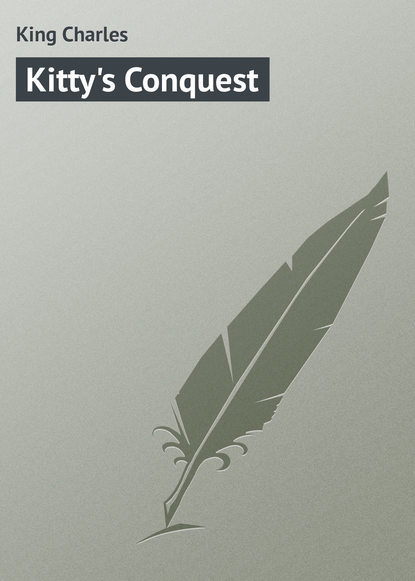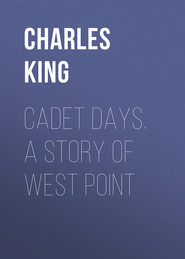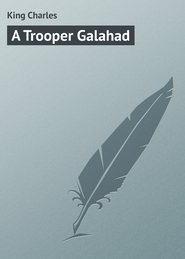По всем вопросам обращайтесь на: info@litportal.ru
(©) 2003-2024.
✖
Kitty's Conquest
Автор
Год написания книги
2017
Настройки чтения
Размер шрифта
Высота строк
Поля
Harrod turned the subject to Hank Smith; and, finding that Amory had not heard of his threat as related by the man whom his friends had "fetched a wipe over the head," repeated it to him, and warned him to be on his guard. Mars took it coolly enough; expressed his readiness to welcome Hank and his adherents to hospitable graves; and, except that his teeth came as solidly together as they had when alluding to the ruffian's escape two nights previous, displayed no symptoms of the slightest emotion at the prospect of losing a quart or two of "heart's-blood" within the month.
Presently Harrod drove off to the village to make some necessary purchases, promising to return for me within an hour. Then I lost not a moment in giving Mars my information about Hank Smith; where he was to be found, etc., but without mentioning Peyton's connection with the affair or stating how the news came into my possession. He asked, of course, but I gave a good reason for declining to name the person who had volunteered the news, at the same time assuring him of my belief in its truth.
Mars was all ablaze in a minute. Chickasaw was at least twelve miles away and to the north. Vinton's plan, and the marshal's, was to go south-west, should they find the ranch abandoned, and search a number of suspected points in Tishomingo and Prentiss Counties. All the gang by this time knew that there was a hunt going on, and, at the cry of "Yanks coming," had scattered in every direction. Smith thought himself safe across the Tennessee, and would probably have only one or two men with him. Amory was fairly excited this time anyhow, and in ten minutes had made up his mind; gave his orders to a non-commissioned officer, wrote a letter to Major Vinton, with instructions to deliver it immediately upon the return of the troop to camp, and before Harrod Summers' return, had vaulted lightly into saddle, waved me a laughing good-by, and trotted off at the head of a little squad of five dragoons, – all the men he could possibly take. I watched them till they disappeared from view on the road to the Tennessee and then sat me down to wait for Harrod.
The corporal who had shown us to Amory's tent was on "sick-report" he said, with chills and fever. He, with three or four others, remained in charge of camp, and I amused myself listening to their talk about their officers and the Ku-Klux. An old darky on a mule came in to sell chickens, and after him, a seedy-looking fellow on a shaggy pony, – he "didn't want nothing in particular, unless it was to know when the captain'd be back."
The corporal was non-committal, – didn't know. The seedy party shifted around in his saddle, and, after profuse expectoration, "reckoned that the lieutenant warn't much hurt nohow."
"Why so?" says the corporal.
"'Cause he's off so quick again."
"That don't prove anything," says the dragoon.
"Whar's he gone to?" says Seedy.
"Don't know."
"Ain't gone far, I reckon; didn't take no rations, did he?"
"Don't know."
"I kind of wondered why he took the north road fur, if he wanted to catch the captain, 'cause I knew he was out towards Guntown."
"How did you know?"
"Well, I heard so, that's all."
The corporal looks steadily at Seedy, and is apparently suspicious. Seedy turns his quid over with his tongue and looks all around. He's a bad hand at extracting information, at all events. At last he makes another venture.
"Wish I knew how far up the north road the lieutenant went. I've got some business up towards the Tennessee. I belong to a missionary society hereabouts, and yet I don't like to take that long ride alone."
I hear the corporal mutter a rather unflattering comment on that statement; and it occurs to me that there is more of the odor of bad whiskey than sanctity about the member of the missionary society. He reminds me of Mr. Stiggins; and Mr. Stiggins makes one more attempt.
"Whar am I most like to catch the boys by dinner-time?"
"Don't know."
The member looks incredulous and indignant; and after a long survey of every object in range about the camp, turns his dejected steed slowly around and shambles off, with the parting shot, —
"Reckon you never did know nothin', did you?" To which the corporal responds, —
"No; and if I did, I wouldn't tell you, Johnny."
Stiggins strikes a canter on reaching the main road, and disappears on the trail of the cavalry. Presently Harrod returns, greatly surprised at Amory's sudden expedition, and curious as to the source from which he derives his information. I hardly know what to say, but finally get out of it by the explanation that it was all "confidential," and that I could say nothing on the subject until his return.
On the drive home we come suddenly upon the troop itself, looking tired and dusty, but returning from the two days' trip to Tishomingo partially successful, and with six rough-looking specimens of "corn-crackers" footing it along between the horsemen. They found no trace of Smith, the marshal tells us, as the men go filing by; but, after all, their luck has been good, and six of the worst characters are now securely under guard.
The major, he tells us, had stopped at Judge Summers's, and expected to find us there; so we whip up and hurry on.
A brisk drive brings us to the plantation in a very few minutes. As we rattle up to the doorway, Harrod catches sight of Mr. Peyton lounging on the portico by the open window of the parlor, for once in his life paying little or no attention to Miss Kitty, who is seated on the old wicker-work sofa, some distance from him, pouting and puzzled.
Harrod warns me to say not a word of Lieutenant Amory's expedition until Peyton is out of the way. Old Jake detains him a moment about "dis yer Hicks's mule done broke into the gyarden las' night," and I move on into the house.
In the parlor are the judge, Major Vinton, and Pauline; the first listening, the second narrating, the third as complete a contrast to Miss Kit as can be imagined. Vinton rises and greets me. He looks dusty, tanned, and travel-stained, but more soldierly than ever in his dark-blue jacket and heavy boots. After Harrod's entrance he resumes his story, – he was telling of the capture of the Ku-Klux, – talking frankly and as though none but friends were near. Harrod shifts uneasily in his chair and glances nervously towards the window. Peyton is invisible, but, beyond doubt, there, and a listener.
It is vain to attempt to warn the major; by this time Peyton knows the whole story, knows who had aided the troops in their search, knows just how the evidence was procured which led to the arrest of the six victims, and doubtless his black-list is swelled by the addition of several names destined to become the recipients of Ku-Klux attentions.
Lunch is announced, and we all sit down at the table, Peyton and Kit coming in from the porch and endeavoring to ignore Major Vinton, a circumstance which apparently renders him no uneasiness whatever. He talks constantly with Pauline, and never gives a glance at the pair. Harrod and I are nervous. I watch Peyton closely, and it requires no penetration to see that not a word of Vinton's is lost on him.
Suddenly there comes the clatter of hoofs on the ground without; the clank of a cavalry sabre, and, a moment after, the ring of spurred heels along the hall. A servant announces the major's orderly; and, begging the major not to rise, the judge directs that the trooper be shown in.
Just as I thought, it is Amory's letter.
"Sergeant Malone said that it was to be given the major directly he returned. Them was the loot'nant's orders, and he told me to ride right over with it, sir," says the orderly. And, apologizing to Miss Summers, the Major opens it and begins to read.
I glance at Harrod; his eyes are fixed on Peyton; Peyton's furtively watching Vinton. Another minute and Vinton has risen to his feet; an eager, flashing light in his eyes, but his voice steady and calm as ever, as he says, —
"Gallop back. Tell Sergeant Malone to send me a dozen men, armed and mounted at once, and you bring my other horse." Away goes the orderly, and then in reply to the wistful look of inquiry in Pauline's eyes, the major says, —
"I must be off again. Amory has obtained information as to the whereabouts of Smith and some of his gang, and has started after them, but with only five men, too few to cope with such desperadoes. He has four hours the start of me now, and 'twill be nearly five before my men can get here; but I must reach him before he attempts to recross the Tennessee."
I cannot be mistaken in Peyton's start of astonishment. Instantly his face turns pale; the secret is out, his complicity perhaps detected. Lunch is forgotten, and we all rise and leave the table. Harrod manages to whisper a caution to the major to say nothing more while Peyton is near, whereat Vinton looks vacant and aghast. Five minutes more and Peyton and Kitty are missed, – gone out for a walk, the servant says. Then Harrod explains, and Vinton looks as though biting his own tongue off close to the roots would be the most congenial and exhilarating recreation that could be suggested. He is annoyed beyond expression, but it is too late now. Peyton is off; no one knows which way, and in half an hour all the real or supposable Ku-Klux in the county will know of the danger that threatens them; know, too, how small a force young Amory has taken with him in his hurried raid to the Tennessee; and, ten to one, if he succeed in capturing Smith, he cannot attempt to recross the river without having to fight his way through.
All this is canvassed in the anxious council that ensues. No time is to be lost; he must be reinforced at once. Harrod orders out his two horses; old Jake is hastily summoned and told to bring up his charger, "Bob"; and while the horses are being saddled, Vinton decides on his plan. He and Harrod are to gallop on after Amory; old Jake to ride down to meet the troopers, with orders to make all speed possible to the Tennessee. I am possessed with an immediate thirst for human gore, and want to go with the major; but there is no other horse, and I couldn't ride without shaking myself to pieces and capsizing every hundred yards or so if there were. To me, therefore, is assigned the cheerful duty of remaining at the plantation and watching Peyton's movements should he return.
Just before the horses are brought around, Kitty comes back, alone. She looks white and scared, and hurries up the steps as though anxious to avoid us, but Harrod intercepts and leads her to one side. She grows paler as he questions and talks to her; and suddenly bursts into tears, and rushes past him into the house.
"He's gone, by heaven!" says Harrod, as he rejoins us. "Kitty says he took the overseer's horse and galloped off towards the north."
"Here, Jake," says Vinton, "waste no time now; ride as though the devil chased you. Tell Sergeant Malone to follow as fast as he can. Don't spare the horses!"
Jake makes a spring; lights on his stomach on old "Bob's" withers; swings himself round; and barely waiting to get his seat, makes vigorous play with both heels on his pet's astonished ribs, and with a "Yoop, da!" our Ethiopian aide-de-camp clatters away. Then comes a hurried and anxious leave-taking with Pauline and the judge, and in another minute our two soldiers trot out to the road. We watch the gallant forms till the riders disappear, and then turn silently away. Pauline's eyes are dim with tears, and she seeks her own room.
That was a wretched afternoon and evening. Kitty never appeared. Pauline came down to tea and tried to entertain me during the long hours that dragged slowly away; but we started at every sound, and when midnight came she retired altogether. We had hoped for news, but none reached us.
The judge dozed fitfully in his easy-chair, but I was too much excited to feel the least drowsiness; so, cigar in mouth, I strolled out to the gate and gazed longingly up the dim, shadowy vista through the woods where lay the road to the Tennessee along which our first news, good or bad, must come.
Two o'clock came first, and I was then reading, in a distracted style, in the library. The clocks had barely ceased striking when my eager ears caught the sound of hoof-beats rapidly nearing us. Down went the book; and in a minute I was at the gate, just in time to meet the horseman, a corporal of Vinton's troop.
"We've got the Ku-Klux all right, sir," he says, as he reins in his jaded steed, "but we had to fight half the county. The lieutenant's wounded, and so is Monahan, one of the men, sir. They are bringing them here, and I'm to ride right on for the doctor."
Off he goes before I can ask more. Pauline meets me as I return to the hall. She is pale as death and her whole frame shakes as she says, "Tell me everything, Mr. Brandon."
"Harrod and Vinton are safe; Amory and one of his men are hurt, and they are bringing them here," I answer.
She saw by my face that there had been a fight. What her woman's heart craved, was to know that those she loved were safe, unhurt, and returning to her. Then the next minute she is all sympathy, all tenderness, even, for our boy sabreur; and she occupies herself with preparations for his reception and nursing.










